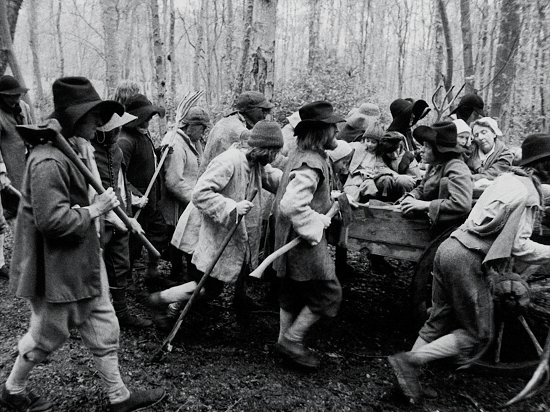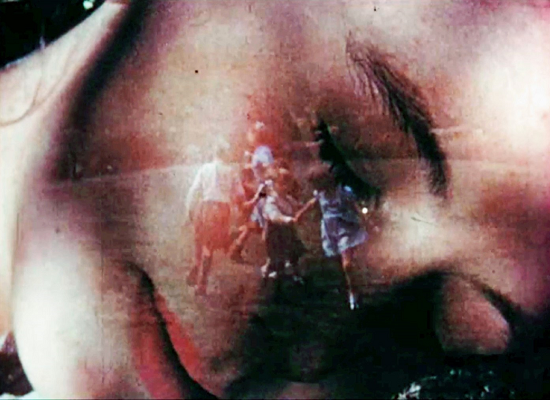A still from Arcadia
Paul Wright’s 2017 documentary Arcadia is a haunting exploration of Britain’s rural history and traditions with a brilliant score by Adrian Utley and Will Gregory. The pair are now taking it on tour for a series of screenings at which they’ll play along with the moving image.
The score is a musical tapestry, moving from dreamy ambience and long-sustained lush keyboard notes to upbeat, bubbly synths and lamenting strings. Many facets of the past are shown in the film, with life in small post-war villages, Druidic communes, and tearaway children, with clips collaged from various archives, broadcasters and private cinematographers. Utley and Gregory help contextualise these images into something unifying and coherent, the haunting and often eerie elements of Britain’s history that are rarely celebrated in our chaotic present. They suggest traditions that we’re in danger of losing, especially in today’s political climate.
Indeed, the film is arguably more relevant today than in 2017, with the countryside under threat from government policies, the regular dumping of sewage in our rivers and off our coast, and worrying news about environmental degradation, from the decline in insect numbers to diseases like ash die-back.
After its successful show at Green Man festival in August, Arcadia Live will begin its tour at St George’s in Bristol on 11 November, followed by the International Documentary Film Festival Amsterdam two days later. The Fire Station in Sunderland is the next step on 30 November, and it’ll play the Howard Assembly Room in Leeds on 3 March 2023 and the Barbican in London on 4 March.
Joining the show is Lisa Knapp, the acclaimed folk singer who has been compared to Shirley Collins and Anne Briggs, the latter of whom’s songs appeared in the original version of Arcadia. To learn more about his involvement and the tour, we chatted with Adrian Utley, who kindly spilled his guts about live scoring, being a kid, and the disappearing countryside.

How did you and Will come together on the original project?
Adrian Utley: I’ve got a good friend, Mark Cosgrove, who is creative director at the Watershed cinema in Bristol. We’re mates, we hang out, and he had spoken with Adrian Cooper from Common Ground about the film. Mark gave me a call and asked if I would be interested in working on it, as somebody who was going to work on it couldn’t do it. So I met Paul Wright in Glasgow, and he sent me some film. And I went to Will, because we worked together quite a lot, and said do you want to get involved in this. And we wrote some music to some images that Paul had sent us, you know, some practice tunes to send to him and see if he liked it. Which he did.
So what what was your ethos for the score?
AU: We felt we should do some kind of collage, because it starts with found music like Elgar, the British idyllic countryside kind of cues, but Paul had put a heavy acid track on one scene, so there’s quite a diversity of music. It had to be like that, so that was our ethos. We worked together on some things, and we did other things separately, and then worked with each other once they were done.
What made you decide to take it on tour?
AU: I was with my wife in St Ives at the Tate Museum where they were showing the film, doing introductions and Q&A after the film. It was quite a few years after we completed it, and Lorna said to me, ‘this seems more relevant now than it did when we made the music for it’. And she suggested ‘why don’t you play it live’, so I mentioned it to Will and we thought it’d be a good idea. It’s actually a lot more work than we thought it would be because of the different styles and the amount of musicians involved. It’s quite a feat getting it together and playing to a click live, and making it absolutely in sync. Both Will and I really like playing live to film. I think it’s another experience, and somebody said to me they really enjoyed watching it at Green Man, even though it was somewhat chaotic, and suggested there’s more humanity to the film and you could get more engrossed because there are musicians. It’s a bleak cold film in many ways, isn’t it?
Absolutely.
AU: There’s a guy from the band Lau who I know, Aidan [O’Rourke] the violin player, he said this to me the other night when I watched them play and he’d seen it at Green Man. I think that’s the same for quite a lot of live scores. I’ve seen Jonny Greenwood and There Will Be Blood live and Mica Levi’s Under the Skin. So that was really cool. I’m a big fan of playing music to film live and I’ll be doing [Dziga Vertov’s] Man With A Movie Camera in Turin in December with a friend.
Have you modified any of the score for the live performances?
AU: We have, actually. We’re playing an acid track that we made, instead of the one that’s on the film. It’s during the dance montage, and one of the things he was talking about with this film was the tribal aspect of humans, and that kind of fed into that. Ross, the amazing guy who’s engineering it, has actually scored all of the Elgar-type stuff. We also made things a little heavier than they were in the film, but it’s mostly pretty much staying where it is.
Lisa Knapp is doing the Anne Briggs vocals?
AU: Yes, she’s doing an amazing job. And that’s not easy, because it has to be to a click. When I first spoke to Anne Briggs about this, we had wanted some folk music in it. And I’d been working with Marry Waterson, and Anne had worked with her mum Lal. So Marry put me in touch with Anne, who was really, really helpful and let us have her unaccompanied music that I’d found on one of her 60s albums with ‘Lowlands’ and ‘My Bonny Boy’, which was sung freely on the record without time unaccompanied. We had to chop it up and make it be in time and then Will did some fantastic orchestrations that means it’s now in tempo. So Lisa doesn’t have the joy of just freely singing those songs, but she’s doing an incredible job. She sounds amazing.
The UK has changed since the film was released and it feels not only more relevant but also more political. Can you say something about that?
AU: I’ll try. I’m not very political, but I mean, we all have become political now, haven’t we? Especially in the last couple of months. Like I said, it seems more relevant because the world is so different now than it was when the film was made. And it was relevant then, but our world, the UK, Britain, has changed so much. We didn’t have Brexit when we made it, and all of the other kinds of bollocks that’s happened since, the chaos. And I also think during lockdown, a lot of middle class people moved out of London into the countryside and destroyed it. I think about Gloucestershire and what’s happened there with all the celebs that have moved down to the Cotswolds. My parents built a modern house in a village in the countryside in the 60s, so I’m as guilty as anyone else. But they’re really moving out into the countryside and destroying these traditions. If you look at Mark Jenkins’ film Bait, that’s a really good example for me of people moving out and changing everything, not for the better, and destroying some of the tradition that was there. I know this is controversial, and I would welcome discussion about it, and hear what other people have got to say, but I think Jeremy Clarkson and people like that moving out to the country and then making programmes about it and pretending to be country people, is odious.

It feels like a kind of fetishisation.
AU: Yeah, well, exactly. I’m not really qualified to talk about this, but I think there’s a lot about the destruction of our traditions, and the thing that’s happening with the destruction of villages. I went to a village near Torridon in Scotland with Mark Cosgrove. It used to be very cut off at one point and the only way they could get stuff was by boat. And we talked to this old lady who put a CD together of old stories of the village and the change was unbelievable. It was almost deserted and half of those houses are holiday houses. So this thriving fishing village is emptying. Obviously lots of Scottish kids or kids in remote areas don’t want to hang out in those places any more, and want some action, or you know, a different life to their fathers and grandfathers. It seems to me that these old pagan traditions and folk ways are disappearing, because there aren’t people to keep it going.
Is there one thing that you want people to take away from watching the show?
AU: It’s difficult for me to say because I didn’t make the film, but making music with Will, we watch the film a lot, and every time I see it I see different things, all the hunting stuff that that I don’t even know how to comment on that other than I absolutely hate it of course. But there are a lot of facets to this film, it’s huge. Lots of people that watch this film have a different take. And I have noticed that I’ve been working with some bands that are in their 20s, and one band said, did you do the music for Arcadia, that’s my girlfriend’s favourite film. She’s like, 21. It’s getting across to another generation, not just the older generation that are already convinced of their views. That’s great.
Yeah, I grew up in the 80s down on the south coast and my memories of those times are so fragmented, but this brought them all back. That was really poignant.
AU: Yeah. Certain things resonate. I loved Victor and Russell, the two little boys fucking about in the church. I’ve got a kid the same age as them, and I was hoping he would never do something like that, but I’ve recently discovered that he actually is, which is what we all did. Climbing over dangerous pipes and swinging over broken glass.


